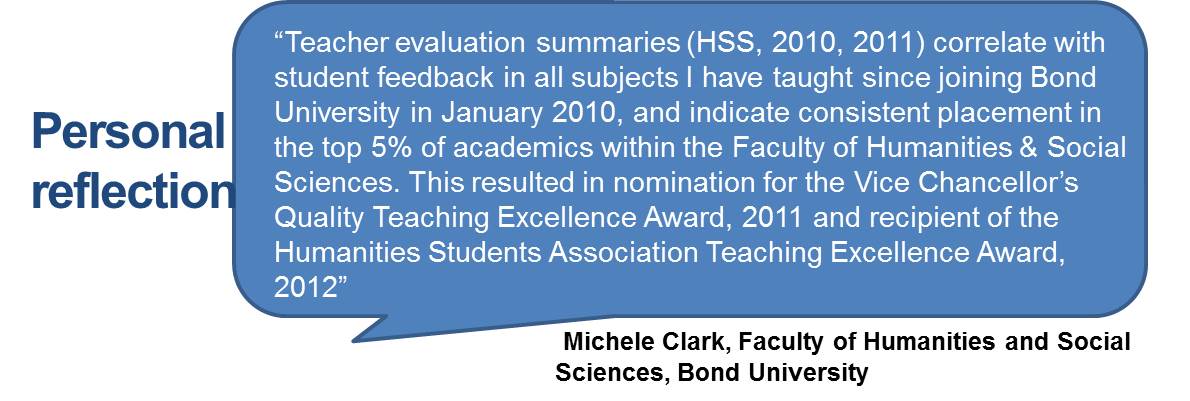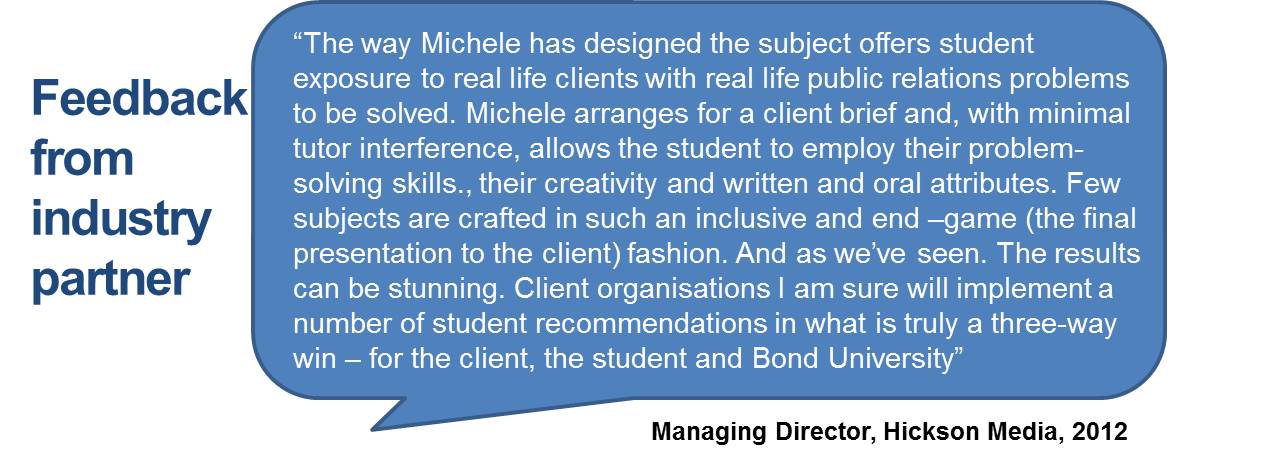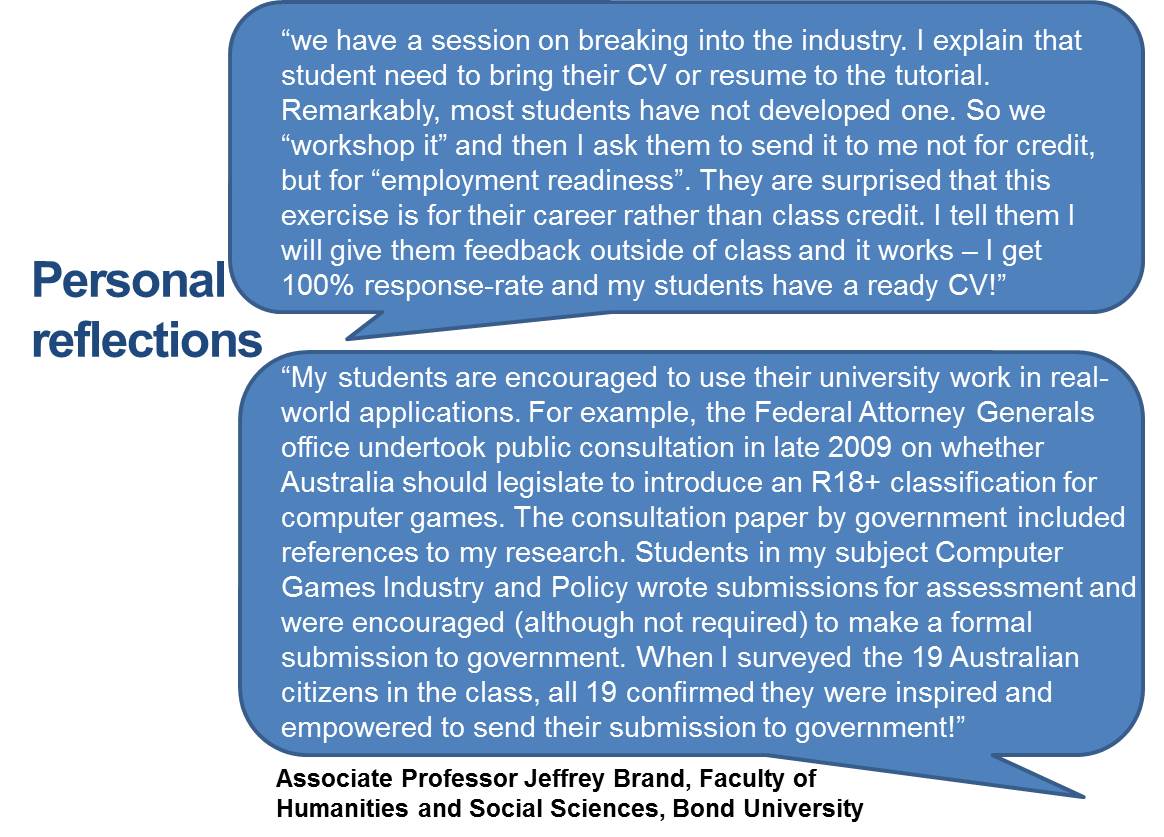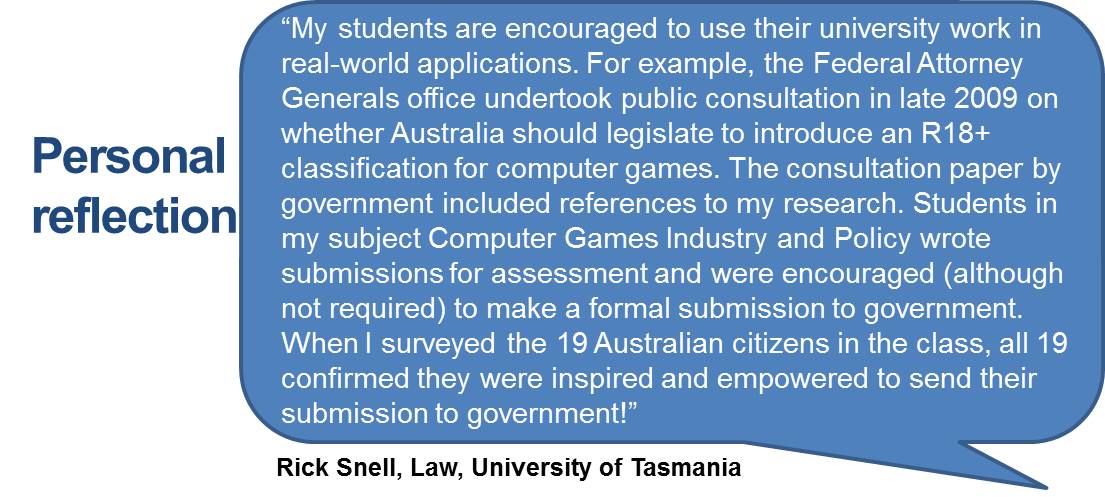Criterion 5
Exemplars
Criterion 5 | Integration of scholarship, research and professional activities with teaching and in support of learning
Exemplar 1 – Michele Clark, Faculty of Humanities and Social Sciences, Bond University
In this teaching award application Michelle reflects on her use of industry-based resources, activities and assessments to engage students and provide them with real world experience. She uses written comments from industry partners and students, teacher evaluation summaries and teaching awards and nominations as evidence.
Wood, K. Knight, D, & Kinash, S (Eds.) (2012). Scholarship of teaching and learning @ Bond: Fostering early career research (Vol. 2). Queensland, Australia: Office of Teaching and Learning, Bond University, pp. 168-173.
Exemplar 2 – Associate Professor Jeffrey Brand, Faculty of Humanities and Social Sciences, Bond University.
Jeffery was nominated for a Citation for the creation of industry-relevant curriculum, professionally and intellectually rich resources and engaging services to inspire and motivate future computer games industry professionals. His application is a good case study for how industry consultation and professional activities can be integrated into teaching and in support of learning. He also effectively uses correspondence from past students to demonstrate how his teaching has influenced students and other outcomes such as employability.
Wood, K. Knight, D, & Kinash, S (Eds.) (2011). Scholarship of teaching and learning @Bond: Fostering early career research. (2011). Queensland, Australia: Office of Quality Teaching and Learning, Bond University, pp. 38-44.
Exemplar 3 – Learning support and resources on engagement, Edith Cowan University
This website encourages the engagement of students in activities that connect them with industry and the working community. It provides guidance and case studies demonstrating how professional activities can be integrated into the teaching of courses in a range of disciplines. For example, in one case study students in an analytical chemistry course are taught to use evaporative light scattering detection to determine the carbohydrate levels present in truffles for a local company. The involvement of the industry provides relevance and interest for the students, while the data produced is of practical use to the industry. The students perform the laboratory techniques and produce a written report comparing their results to existing literature. The best two lab reports are given to the truffle company who provide feedback on the report and data.
Edith Cowan University. Learning Support and Resources; engagement.
Exemplar 4 – Opening lines; approaches to the scholarship of teaching and learning
In this book, eight scholars working in different fields and institutional contexts tell the story of their inquiry into the scholarship of teaching and learning (SoTL). They describe the investigative strategies they considered and chose, the rationale behind their approach, how the various approaches worked or did not, what was learnt from the work and their advice for other people engaging in SoTL research for the first time. A variety of approaches to SoTL are demonstrated with emphasis on methods and approach.
Hutchings, P. (Ed.) (2000). Opening lines; approaches to the scholarship of teaching and learning [Book]. California, United States of America: The Carnegie Foundation for the Advancement of Teaching.
Exemplar 5 – Rick Snell, Not just another brick in the wall
In this book chapter, Rick Snell reflects on how and why he uses a project based learning approach that involves students in empirical research, instead of traditional teaching and assessment methods. He provides comments from students that support his claims that the integration of research into the curriculum is effective in engaging and empowering students and promoting deep learning.
Snell, R. (1997). Not just another brick in the wall. In, R. Ballantyne, J., Bain, & J. Packer (Eds.), Reflecting on university teaching; academics’ stories (pp. 423-435). Canberra, Australia: Department of Employment, Education, Training and Youth Affairs.







